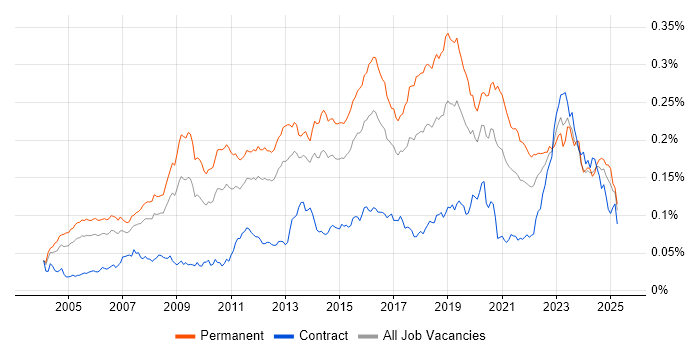Application Support Engineer
UK
The median Application Support Engineer salary in the UK is £43,250 per year, according to job vacancies posted during the 6 months leading to 18 May 2025.
The table below provides salary benchmarking and summary statistics, comparing them to the same period in the previous two years.
| 6 months to 18 May 2025 |
Same period 2024 | Same period 2023 | |
|---|---|---|---|
| Rank | 645 | 755 | 795 |
| Rank change year-on-year | +110 | +40 | +159 |
| Permanent jobs requiring an Applications Support Engineer | 84 | 128 | 166 |
| As % of all permanent jobs advertised in the UK | 0.15% | 0.13% | 0.17% |
| As % of the Job Titles category | 0.17% | 0.14% | 0.18% |
| Number of salaries quoted | 80 | 112 | 119 |
| 10th Percentile | £31,250 | £26,750 | £29,950 |
| 25th Percentile | £35,000 | £31,250 | £32,500 |
| Median annual salary (50th Percentile) | £43,250 | £40,000 | £45,000 |
| Median % change year-on-year | +8.13% | -11.11% | +5.88% |
| 75th Percentile | £52,500 | £52,750 | £57,500 |
| 90th Percentile | £63,750 | £84,250 | £66,250 |
| UK excluding London median annual salary | £42,500 | £38,750 | £35,000 |
| % change year-on-year | +9.68% | +10.71% | -12.50% |
All Permanent IT Job Vacancies
UK
For comparison with the information above, the following table provides summary statistics for all permanent IT job vacancies. Most job vacancies include a discernible job title that can be normalized. As such, the figures in the second row provide an indication of the number of permanent jobs in our overall sample.
| Permanent vacancies in the UK with a recognized job title | 50,837 | 94,491 | 90,806 |
| % of permanent jobs with a recognized job title | 90.77% | 94.69% | 91.50% |
| Number of salaries quoted | 27,317 | 67,546 | 57,366 |
| 10th Percentile | £29,500 | £28,500 | £32,500 |
| 25th Percentile | £41,250 | £38,500 | £45,000 |
| Median annual salary (50th Percentile) | £56,000 | £52,500 | £60,000 |
| Median % change year-on-year | +6.67% | -12.50% | - |
| 75th Percentile | £73,886 | £71,000 | £80,000 |
| 90th Percentile | £96,250 | £90,000 | £100,000 |
| UK excluding London median annual salary | £51,645 | £50,000 | £53,000 |
| % change year-on-year | +3.29% | -5.66% | +6.00% |
Applications Support Engineer
Job Vacancy Trend
Job postings that featured Applications Support Engineer in the job title as a proportion of all IT jobs advertised.

Applications Support Engineer
Salary Trend
3-month moving average salary quoted in jobs citing Applications Support Engineer.
Applications Support Engineer
Salary Histogram
Salary distribution for jobs citing Applications Support Engineer over the 6 months to 18 May 2025.
Applications Support Engineer
Top 14 Job Locations
The table below looks at the demand and provides a guide to the median salaries quoted in IT jobs citing Applications Support Engineer within the UK over the 6 months to 18 May 2025. The 'Rank Change' column provides an indication of the change in demand within each location based on the same 6 month period last year.
| Location | Rank Change on Same Period Last Year |
Matching Permanent IT Job Ads |
Median Salary Past 6 Months |
Median Salary % Change on Same Period Last Year |
Live Jobs |
|---|---|---|---|---|---|
| England | +98 | 81 | £42,500 | +6.25% | 80 |
| UK excluding London | +151 | 65 | £42,500 | +9.68% | 50 |
| Work from Home | +104 | 27 | £50,000 | +17.65% | 42 |
| South East | +85 | 27 | £50,000 | +17.65% | 21 |
| Midlands | +52 | 17 | £52,500 | +84.21% | 2 |
| London | +93 | 16 | £63,750 | +6.25% | 42 |
| West Midlands | +57 | 12 | £52,500 | +61.54% | 1 |
| East of England | +48 | 10 | £42,000 | -1.18% | 6 |
| North of England | +46 | 8 | £35,349 | -11.63% | 15 |
| Yorkshire | +68 | 7 | £35,000 | -12.50% | 10 |
| East Midlands | +2 | 5 | £32,500 | +14.04% | 1 |
| South West | +105 | 2 | £46,250 | +27.59% | 6 |
| Wales | +36 | 1 | £45,000 | -5.26% | 1 |
| North West | -2 | 1 | £35,698 | -18.41% | 4 |
Applications Support Engineer Skill Set
Top 30 Co-occurring Skills and Capabilities
For the 6 months to 18 May 2025, Applications Support Engineer job roles required the following skills and capabilities in order of popularity. The figures indicate the absolute number co-occurrences and as a proportion of all permanent job ads featuring Applications Support Engineer in the job title.
|
|
Applications Support Engineer Skill Set
Co-occurring Skills and Capabilities by Category
The follow tables expand on the table above by listing co-occurrences grouped by category. The same employment type, locality and period is covered with up to 20 co-occurrences shown in each of the following categories:
|
|
|||||||||||||||||||||||||||||||||||||||||||||||||||||||||||||||||||||||||||||||||||||||||||||
|
|
|||||||||||||||||||||||||||||||||||||||||||||||||||||||||||||||||||||||||||||||||||||||||||||
|
|
|||||||||||||||||||||||||||||||||||||||||||||||||||||||||||||||||||||||||||||||||||||||||||||
|
|
|||||||||||||||||||||||||||||||||||||||||||||||||||||||||||||||||||||||||||||||||||||||||||||
|
|
|||||||||||||||||||||||||||||||||||||||||||||||||||||||||||||||||||||||||||||||||||||||||||||
|
|
|||||||||||||||||||||||||||||||||||||||||||||||||||||||||||||||||||||||||||||||||||||||||||||
|
|
|||||||||||||||||||||||||||||||||||||||||||||||||||||||||||||||||||||||||||||||||||||||||||||
|
|
|||||||||||||||||||||||||||||||||||||||||||||||||||||||||||||||||||||||||||||||||||||||||||||
|
|
|||||||||||||||||||||||||||||||||||||||||||||||||||||||||||||||||||||||||||||||||||||||||||||
